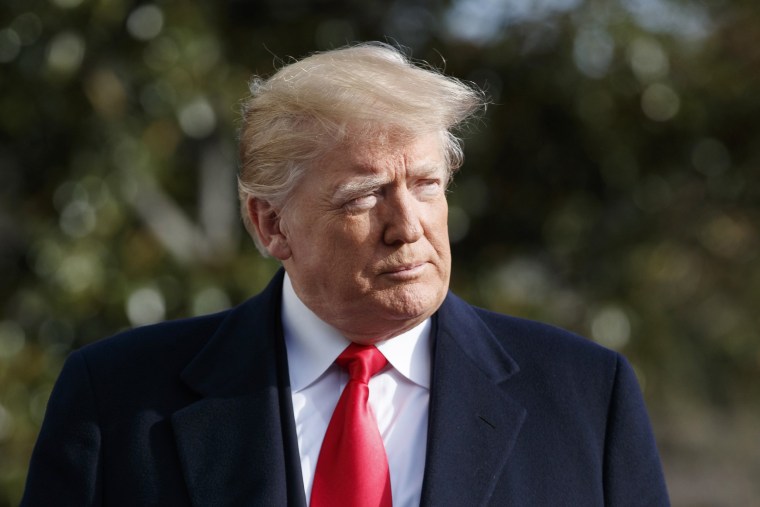WASHINGTON — President Donald Trump said Monday he plans to give a prime-time speech on border security and visit the U.S.-Mexico border this week amid a partial federal government shutdown over his insistence on building a wall there.
Trump tweeted that he would "Address the Nation on the Humanitarian and National Security crisis on our Southern Border" on Tuesday at 9 p.m. ET shortly after the White House announced he would visit the border on Thursday. The speech will be carried live on the major networks and cable news channels.
It will be Trump's first address from the Oval Office, delivered just three weeks before he is set to appear before a joint session of Congress to give his annual assessment of the State of the Union.
In 2014, the networks turned down President Obama's request for similar airtime to deliver a speech on immigration, though it did air on several cable channels.
"President @realDonaldTrump will travel to the Southern border on Thursday to meet with those on the frontlines of the national security and humanitarian crisis," White House press secretary Sarah Sanders wrote on Twitter Monday. "More details will be announced soon."
The announcements come after a weekend in which White House negotiators, led by Vice President Mike Pence, and congressional staff made little apparent headway in trying to resolve the impasse, which has led several federal agencies — accounting for about a quarter of the federal government — to cease all functions but those deemed most "essential" to the public.
Pence and Homeland Security Secretary Kristjen Nielsen are scheduled to give a briefing to House Republicans on the border wall negotiations at 5:30 p.m. Tuesday, just a few hours before Trump addresses the nation.
Trump has asked Congress for nearly $6 billion in funding for a border wall, while House Speaker Nancy Pelosi, D-Calif., has said that she will not agree to give him a dime for that purpose.
On Sunday, acting director of the Office of Management and Budget Russell Vought sent a letter to House Appropriations Committee Chairwoman Nita Lowey, D-N.Y., outlining the president's specific requests for border-security funding.
The White House asked for $5.7 billion for a steel barrier, which Vought wrote would "fund construction of a total of approximately 234 miles of new physical barrier and fully fund the top 10 priorities in CBP's Border Security Improvement Plan."
In addition, the president wants $4.2 billion to support a capacity of 52,000 detention beds; $563 million for 75 immigration judges; $211 million to hire 750 more border-patrol agents; $571 million for law enforcement officers in U.S. communities to fight gang violence, smuggling and trafficking; $800 million for humanitarian needs, including medical care for detainees; and $675 million to improve technology for inspecting vehicles coming through border checkpoints for contraband.
The overall increase in spending would be $7 billion, as Congress was already planning to fund some of the president's priorities at different levels.
Before the partial shutdown began on Dec. 22, the Senate unanimously passed a government-funding bill providing more than $1 billion for border security but none of that money was earmarked for a wall. The House, then controlled by Republicans, passed a version that included Trump's request.
Those two bills died as the new Congress began Jan. 3, and the House, now led by Democrats, has since passed bills to re-open the government that do not include wall money. Senate Majority Leader Mitch McConnell, R-Ky., has refused to take up that legislation because Trump has indicated that he won't sign it.
White House officials have been looking at ways to use existing legal authority and money already appropriated by Congress to build the wall if lawmakers do not provide the cash Trump wants.
"I may declare a national emergency dependent on what's going to happen over the next few days," the president said Sunday.
It's not clear exactly how Trump could use his power to declare a "national emergency" for the construction of a wall or where the money would come from. Under current law, the defense secretary can transfer up to $4 billion between programs if he deems such a move to be in the "national interest." But he must notify Congress — which, in the past, has meant sign-off from top lawmakers who oversee defense spending — and it can't be for a purpose for which Congress has previously denied funding.
Rep. Joaquín Castro, D-Texas, said that any attempt at an end-run around Congress would meet with stiff resistance.
"It would be profoundly inappropriate for the president of the United States to circumvent the legislative branch of the United States government, the United States Congress, and single-handedly, against the will of the American people and the American Congress, put up a border wall on the U.S.-Mexico border," he said. "We would challenge it in every single way that we could — in Congress, in the courts and otherwise."
The Oval Office has become a less common setting for presidential addresses to the nation in recent years. While President Bill Clinton used the venue 15 times, President George W. Bush delivered speeches there six times, and President Barack Obama gave remarks from the most famous office in Washington just three times.

